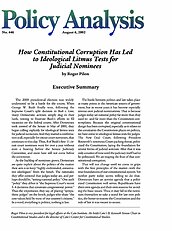The 2000 presidential election was widely understood to be a battle for the courts. When George W. Bush finally won, following the Supreme Court’s split decision in Bush v. Gore, many Democratic activists simply dug in their heels, vowing to frustrate Bush’s efforts to fill vacancies on the federal courts. After Democrats took control of the Senate in May of 2001, they began calling explicitly for ideological litmus tests for judicial nominees. And they started a confirmation stall, especially for circuit court nominees, that continues to this day. Thus, 8 of Bush’s first 11 circuit court nominees went for over a year without even a hearing before the Senate Judiciary Committee, and most have still not come before the committee.
As the backlog of nominees grows, Democrats are quite explicit about the politics of the matter: their aim is to keep “highly credentialed, conservative ideologues” from the bench. The rationales they offer contend that judges today are, and perhaps should be, “setting national policy.” One such “policy” they abhor is “the Supreme Court’s recent 5–4 decisions that constrain congressional power.” Thus the importance, they say, of placing “sympathetic judges” on the bench, judges who share “the core values held by most of our country’s citizens.” In a word, everything is politics, nothing is law.
The battle between politics and law takes place at many points in the American system of government, but in recent years it has become especially intense over judicial nominations. That is because judges today set national policy far more than they used to–and far more than the Constitution contemplates. Because the original constitutional design has been corrupted, especially as it relates to the constraints the Constitution places on politics, we have come to ideological litmus tests for judges. The New Deal Court, following President Roosevelt’s notorious Court-packing threat, politicized the Constitution, laying the foundation for several forms of judicial activism. After that it was only a matter of time until the judiciary itself had to be politicized. We are reaping the fruit of that constitutional corruption.
That will not change until we come to grips with the first principles of the matter–with the true foundations of our constitutional system. Yet neither party today seems willing to do that. Democrats have an activist agenda that a politicized Constitution well serves. Republicans have their own agenda and their own reasons for avoiding the basic issues. Thus, it may fall to the nominees themselves to take a stand for law over politics, the better to restore the Constitution and the rule of law it was meant to secure.

This work is licensed under a Creative Commons Attribution-NonCommercial-ShareAlike 4.0 International License.

